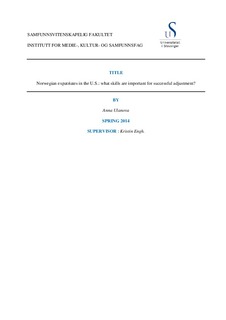Norwegian expatriates in the U.S.: what skills are important for successful adjustment?
Master thesis
Permanent lenke
http://hdl.handle.net/11250/221291Utgivelsesdato
2014-06-24Metadata
Vis full innførselSamlinger
- Studentoppgaver (SV-IMS) [1384]
Sammendrag
This study is an attempt to gain insight into the process of cross-cultural adjustment and development of cross-cultural skills by Norwegian expatriates living and working in the United States.
Purpose
The purpose of the thesis is to define the cross-cultural skills which have the most significant impact and lead to a smooth adjustment and adaptation of Norwegian expatriates to a new cultural environment in the U.S. Adjustment to a new cultural environment is a challenging process which requires change in behavioral and communication patterns that should be adapted to the accepted norms of a host culture. The study makes an attempt to explore the phenomenon of cross-cultural skills and their relation to cross-cultural adjustment and cultural differences.
Research methodology
This is an exploratory study. It is qualitative in nature and focused on cross-cultural skills significant for cross-cultural adjustment of Norwegian expatriates during the period of their assignment in the U.S. Interviews were chosen to collect the primary data as one of the commonly used research methods within studies with explorative design. The sample population is Norwegian expatriates, working and living in the U.S. The respondents are employees of different multinational companies on their foreign assignment in the United States for a period from two to five years. All eight in-depth, semi-structured interviews with open-ended questions were conducted in the United States.
Findings
Cultural differences between Norway and the U.S. define the main areas for cross-cultural adjustment. The cross-cultural adjustment requires a certain degree of change from Norwegian expatriates. In order to adjust, the expatriates have to go through a transformation process and develop certain cross-cultural skills required for a comfortable well-being in the U.S.
The research findings lead to the assumption that cultural differences trigger the development of certain cross-cultural skills required for adjustment to the new cultural environment.
Norwegian expatriates define their adjustment as a smooth process. Research findings indicate that Norwegian expatriates consciously choose a light form of integration which implies avoidance of deep immersion into a new cultural environment. The light form of integration is caused by two factors: insignificant cultural differences which create predisposition for the adjustment and a status of short-term settlers.
The research findings provide an answer to the main research question in the overview of cross-cultural skills required for a smooth and successful adjustment of Norwegian expatriates in the U.S. The six cross-cultural skills were defined by Norwegian expatriates as the most significant for the adjustment:
1. Openness and curiosity. 2. The ability to be sensitive. 3. The ability to display behavioral adaptation and flexibility. 4. The ability to communicate interpersonally. 5. The ability to communicate effectively. 6. Language proficiency, clarity and conversational skills.
Conclusions
Cross-cultural adjustment provides Norwegian expatriates with an exclusive possibility to be exposed to a new culture, be challenged both mentally and professionally which leads to an improvement and development of cross-cultural skills. Cross-cultural skills imply a valuable knowledge of a host culture and abilities which help expatriates to fit in a new cultural environment.
Those expatriates who recognize the importance of this knowledge and a necessity to work on development of cross-cultural skills have a unique chance to learn new skills and grow on a foreign assignment experience.
Beskrivelse
Master's thesis in Change management

